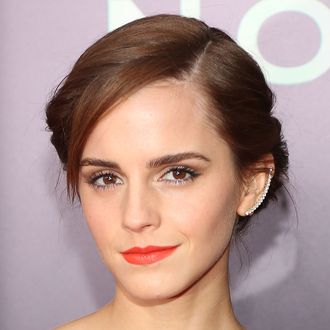
Freshly anointed U.N. Women Goodwill Ambassador Emma Watson gave a speech at the U.N. headquarters yesterday in honor of the new “HeForShe” gender equality campaign, which aims to “mobilize men against gender inequalities.” In an event hosted by Wolf Blitzer and attended by actors including Kiefer Sutherland and Forest Whitaker, Watson spoke passionately — albeit self-effacingly — about her desire to combat gender inequality: “You might be thinking, who is this Harry Potter girl? And what is she doing up onstage at the U.N.? It’s a good question, and trust me, I have been asking myself the same thing. I don’t know if I am qualified to be here. All I know is that I care about this problem. And I want to make it better.” (It would seem that Watson’s concerns about being pigeonholed as Hermione are justified, with United Nations Secretary-General Ban Ki-moon saying of Watson, “She’s been using her magic wand in her movie. I hope she will use [her] magic wand to stop violence against women.”)
In her speech, Watson spoke out about her feminism, criticizing the notion that being a feminist has become “synonymous with man-hating.”
When I was 8, I was confused about being called “bossy” because I wanted to direct the plays that we would put on for our parents. But the boys were not. When at 14, I started to be sexualized by certain elements of the media, when at 15, my girlfriends started dropping out of their beloved sports teams because they didn’t want to appear “muscle-y,” when at 18, my male friends were unable to express their feelings, I decided that I was a feminist. And this seems uncomplicated to me. But my recent research has shown me that feminism has become an unpopular word. Women are choosing not to identify as feminists.
Apparently, I am among the ranks of women whose expressions are seen as too strong, “too aggressive,” isolating, and anti-men, unattractive, even. Why has the word become such an uncomfortable one?
And here’s a video of the speech (you can read the full text here):

